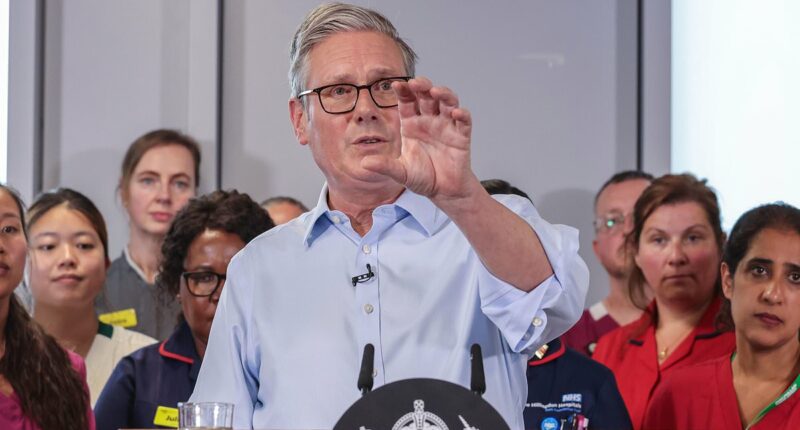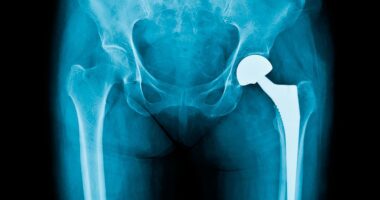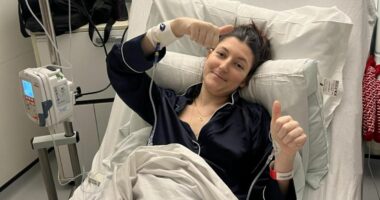Share this @internewscast.com
More than a fifth of patients in some parts of England are suffering ‘poor’ experiences at their GP, official data revealed today.
Figures show nationally just 10 per cent of people were dissatisfied with the care they experienced between May and June this year.
But in Nottinghamshire, the figure is 22.5 per cent, according to the Office for National Statistics (ONS).
By comparison, just 4.3 per cent of patients were dissatisfied in Coventry and Warwickshire.
It comes as the latest GP patient survey last week—jointly carried out by NHS England and Ipsos—discovered patient satisfaction with GP services has improved on the previous year.
Ministers have been under renewed pressure to fix the crisis in general practice and banish the hated 8am scramble for appointments millions face every morning.
Disgruntled patients have even previously complained of having to visit A&E instead, heaping extra pressure on swamped casualty units.
In the NHS 10 year plan, unveiled earlier this month by the Government however, Downing Street pledged to tackle the crisis head on and ‘bring back the family doctor’.
The ONS survey, carried out between May 27 to June 18, asked over 75,000 participants about their experiences of contacting and attending GP surgeries.
According to the report, patients in Derby and Derbyshire followed Nottinghamshire, with 18.7 per cent reporting a ‘poor’ experience with GP services.
Kent and Medway, meanwhile, logged a figure of 17.5 per cent.
Patients in Bristol, North Somerset, South Gloucestershire and Shropshire, Telford and Wrekin, both reported a 16 per cent dissatisfaction rate.
The report, however, also found the proportion of people who had a ‘poor’ experience nationally fell to 10.9 per cent, down from the 15 per cent reported in July and August 2024.
Equally, the percentage of people who found it ‘difficult’ to contact their GP practice decreased from 18.7 per cent in July to 15 August 2024to 10.6 per cent in May and June 2025.
The GP crisis has been bubbling away for years, despite multiple ministerial promises to fix it.
In total, there are now just over 28,000 fully-qualified full-time GPs in England. Numbers have dwindled over the past decade despite attempts to recruit thousands more.

In the NHS 10 year plan, unveiled earlier this month by the Government, Downing Street pledged to tackle the GP crisis head on and ‘bring back the family doctor’
Many are retiring in their 50s, moving abroad or leaving to work in the private sector because of soaring demand, paperwork and aggressive media coverage in the NHS.
At the same time, the population has also grown, exacerbating the problem.
It means millions of patients are rushed through, in scenes compared as ‘goods on a factory conveyor belt’.
Some have described it as being impossible to see a GP, with a Glastonbury-esque to get an appointment.
But in the 10 Year Plan for Health, unveiled earlier this month, the Government revealed community outreach, which sees clinicians going door to door, would reduce pressure on GPs and A&E.
The plans also outlined training for thousands more GPs, to end the ‘8am scramble’ to get an appointment.
GPs will be encouraged to use artificial intelligence to take notes, while technology will be used to speed up the answering of calls to surgeries.
Sir Keir said: ‘The NHS should be there for everyone, whenever they need it.
‘It’s reform or die. Our 10-year health plan will fundamentally rewire and future-proof our NHS so that it puts care on people’s doorsteps, harnesses game-changing tech and prevents illness in the first place.
‘That means giving everyone access to GPs, nurses and wider support all under one roof in their neighbourhood—rebalancing our health system so that it fits around patients’ lives, not the other way round.’
It comes as the latest GP patient satisfaction survey last week found 75 per cent of 702,000 respondents had a good experience at their practice, up slightly from 74 per cent in 2024.
Some 70 per cent also said their overall experience of contacting their family doctor was good, up year-on-year from 67 per cent.
At the time, Louise Ansari, chief executive at Healthwatch England, said: ‘It’s promising that this year’s findings show modest increases in people’s overall experiences of GP, including an increase in the number of people given a choice of time, day or location for their most recent appointment.
‘We know from previous years’ results that this directly links to improvements in overall experience.
‘However, our recent research shows there is a gap between the choices people want and the ones they get.’
Health and Social Care Secretary, Wes Streeting, said: ‘Within the first year of a new government, we’ve made real progress fixing the front door of the NHS and getting people back to seeing their GPs. Fewer patients are struggling to get through to their practice, and fewer are having poor experiences – that’s a concrete improvement delivered in just one year, fixing the NHS following 14 years of neglect.
‘We’ve already recruited 1,900 more GPs, strengthening primary care and ensuring patients can access the healthcare they need when they need it. Our 10 Year Health Plan will bring healthcare to your doorstep with new neighbourhood services and cutting-edge digital tools to ease workloads for our hardworking staff.
‘There’s a long way to go, but the investment and reform this government is making through our Plan for Change has finally put the NHS on the road to recovery.’













